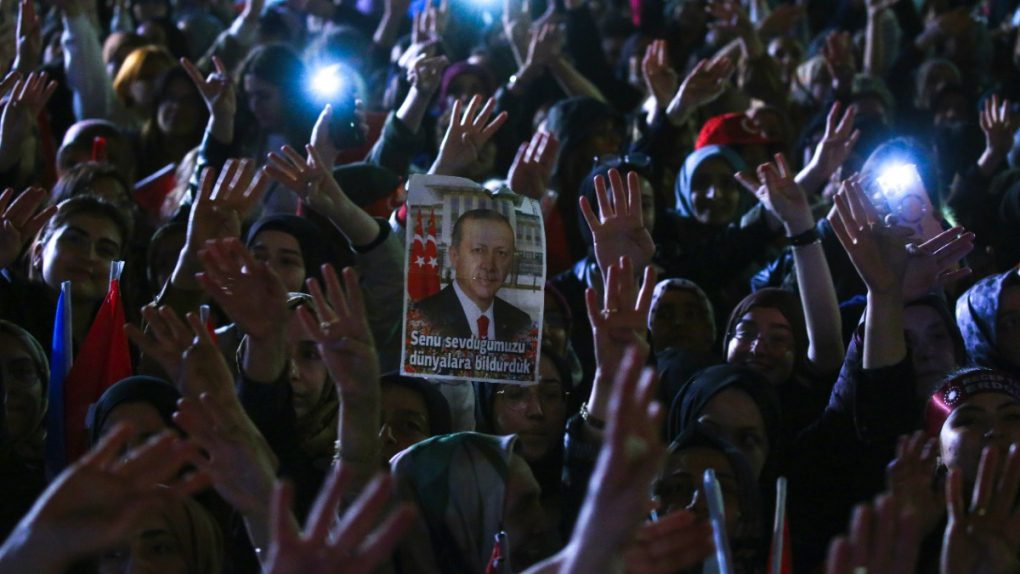Global Courant 2023-05-15 14:49:44
ANKARA, Turkey –
Turkiye’s presidential election appeared to be heading for a runoff on Monday, with President Recep Tayyip Erdogan, who has ruled his country with a tight grip for 20 years, leading his main challenger but failing to secure the votes needed for an outright victory.
With 99.4% of the domestic vote and 84% of the foreign vote tallied, Erdogan had 49.4% of the vote, while his main rival, Kemal Kilicdaroglu, garnered 45%, Ahmet Yener, the head of the Supreme Electoral Council, said. , to reporters. A third candidate, nationalist politician Sinan Ogan, got 5.2%.
Erdogan, 69, told supporters in the early hours of Monday that he could still win. However, he said he would respect the country’s decision if the race led to a second round on May 28.
The mood has been closely watched to see if the strategically located NATO country – with a Black Sea coast to the north and neighbors Iran, Iraq and Syria to the south – remains under the control of the increasingly authoritarian president. or may take a more democratic path that Kilicdaroglu envisioned.
Polls ahead of Sunday’s vote had given Kilicdaroglu, the joint candidate of a six-party opposition alliance, a slight lead over Erdogan, who has ruled Turkiye as prime minister or president since 2003.
Kilicdaroglu sounded hopeful for a second round win.
“We will absolutely win the second round… and bring democracy,” said 74-year-old Kilicdaroglu, who claimed Erdogan had lost the confidence of a nation now demanding change.
Ogan has not said who he would support if the election goes to a second round. He is believed to have gained support from voters who wanted change after two decades under Erdogan but were unconvinced by the ability of the Kilicdaroglu-led six-party alliance to govern.
The election results showed that Erdogan’s ruling Justice and Development Party would also retain its majority in the 600-seat parliament, although the assembly has lost much of its legislative power following a referendum to change the country’s system of governance to an executive one. presidency scary 2017 successful.
Anadolu news agency said Erdogan’s ruling party alliance hovered around 49.3%, while Kilicdaroglu’s Nation Alliance had around 35.2% and support for a pro-Kurdish party was above 10%.
The fact that Erdogan appears to have retained his majority increases his chances of winning a runoff vote, with more voters likely to support Erdogan to avoid a divided legislature.
This year’s elections came against a backdrop of economic turmoil, a cost-of-living crisis and an earthquake in February that killed more than 50,000 people. Western countries and foreign investors are also waiting for the outcome because of Erdogan’s unorthodox leadership of the economy and often spry but successful attempts to put Turkiye at the center of international negotiations.
As in previous years, Erdogan led a highly divisive campaign in his bid to extend his rule into a third decade. He portrayed Kilicdaroglu, who had gained the support of the country’s pro-Kurdish party, working with “terrorists” and aiding what he called “deviant” LGBTQ2S+ rights. In an effort to win over voters hit hard by inflation, he raised wages and pensions and subsidized electricity and gas bills, while highlighting Turkiye’s defense industry and infrastructure projects.
Kilicdaroglu, for his part, campaigned on promises to reverse crackdowns on free speech and other forms of democratic decline, and to restore an economy battered by high inflation and currency devaluation.
“The fact that the election results are not yet final does not change the fact that the nation has elected us,” Erdogan said.
More than 64 million people, including the foreign voters, were eligible to vote and nearly 89% voted. This year marks 100 years since Turkiye was founded as a republic – a modern, secular state that emerged from the ashes of the Ottoman Empire.
Voter turnout in Turkiye is traditionally high, despite the fact that the government has suppressed freedom of speech and assembly over the years, especially since an attempted coup in 2016. Erdogan blamed the failed coup on followers of a former ally, the cleric Fethullah Gülen, and launched a large-scale crackdown on officials allegedly associated with Gülen and against pro-Kurdish politicians.
Erdogan, along with the United Nations, helped broker a deal with Ukraine and Russia that would allow Ukrainian grain to reach the rest of the world from its Black Sea ports, despite Russia’s war in Ukraine. The agreement, which is being implemented by a center in Istanbul, expires in a few days, and Turkiye organized talks last week to keep it alive.
But Erdogan has also blocked Sweden’s quest to join NATO, arguing that the country has been too lenient with followers of the US-based cleric and members of pro-Kurdish groups that Turkiye sees as threats to the national safety.
Critics argue the president’s heavy-handed style is responsible for a painful cost-of-living crisis. According to the latest official statistics, inflation is about 44%, down from a high of about 86%. The price of vegetables became a campaign theme for the opposition, which used an onion as its symbol.
Contrary to mainstream economic thinking, Erdogan claims that high interest rates fuel inflation, and he pressured the Central Bank of the Republic of Turkiye to cut its main rate several times.
Erdogan’s government was also criticized for allegedly delayed and immature response to the magnitude 7.8 earthquake that devastated 11 southern provinces. Lax implementation of building codes is said to have exacerbated casualties and misery.




